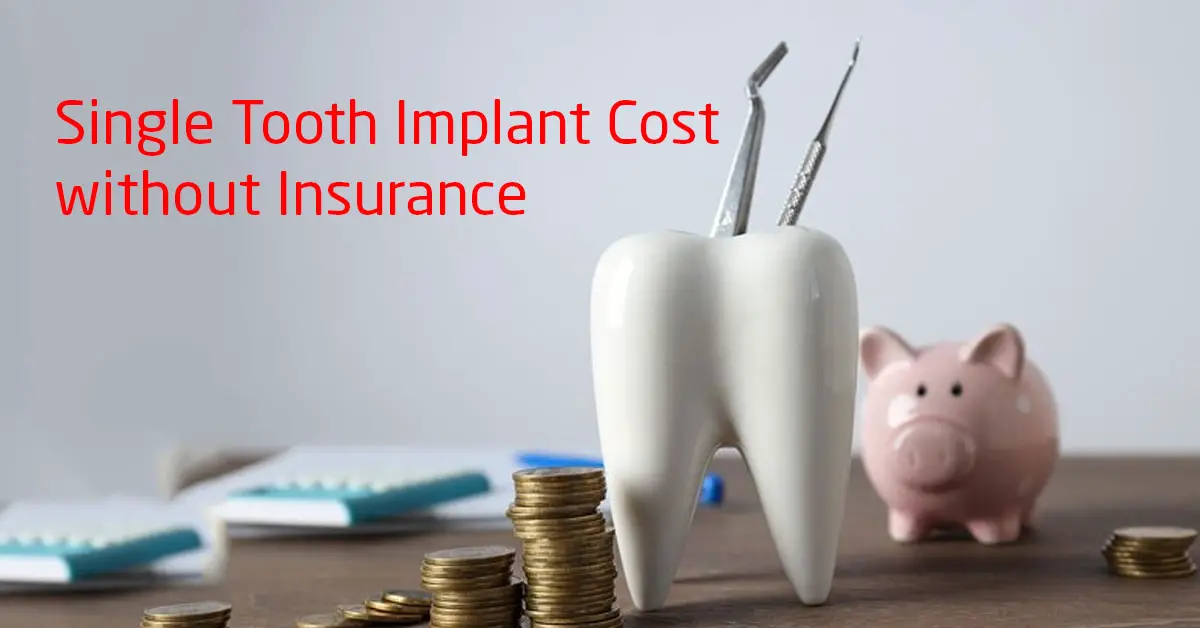Affordable Dental Implants: The Comprehensive Guide to Single Tooth Implant Cost
Are you considering a single tooth implant but worried about the expenses without insurance coverage? Look no further! This comprehensive guide will delve into the cost of single tooth implants without insurance and provide valuable insights to aid your decision-making process. Whether you’ve lost a tooth due to an accident or decay, a dental implant can restore your smile and promote better oral health. Let’s explore the realm of dental implants and understand the potential costs based on various factors.
Understanding Single Tooth Implants
What exactly is a single tooth implant? It’s a dental procedure designed to replace a missing tooth by implanting an artificial tooth securely into the jawbone. Unlike traditional dentures or bridges, which rely on neighboring teeth for support, a single tooth implant stands alone, resembling and functioning much like a natural tooth. Consisting of a titanium post acting as the tooth root, a porcelain or ceramic crown for aesthetics, and an abutment connecting the crown to the implant, this solution not only restores your smile but also prevents future dental complications by stimulating the jawbone and maintaining facial structure.
Factors Influencing Single Tooth Implant Costs
Several factors influence the overall cost of a single tooth implant without insurance:
1. Geographic Location: Dental treatment costs vary based on location, with urban areas typically commanding higher prices than rural regions.
2. Dentist’s Expertise: Experienced dentists may charge more due to their skill and reputation.
3. Type of Materials: High-quality materials may incur additional costs but offer better durability and aesthetics.
4. Additional Procedures: Pre-implant procedures like bone grafting can increase the overall cost.
5. Implant Location: The position of the missing tooth affects customization and pricing.
6. Diagnostic Imaging: X-rays and CT scans for evaluation add to the total cost.
Consulting with a dental professional can provide a personalized cost estimate based on these factors.
Average Cost of Single Tooth Implant
The average cost of a single tooth implant without insurance ranges from $3,000 to $6,000 per tooth. This estimate covers the surgical procedure, abutment, and crown, with additional expenses such as diagnostic imaging and consultations to consider.
Cost-Effective Alternatives
If affordability is a concern, there are alternative options to consider:
1. Partial Dentures: These removable options are cheaper but offer less stability than implants.
2. Fixed Dental Bridges: While providing stability, they require altering adjacent teeth.
3. Temporary Solutions: Short-term measures like fillings can be considered until opting for a permanent solution.
Although these alternatives may offer immediate solutions at a lower cost, they may not match the durability of dental implants.
Financing Options for Single Tooth Implants
To make implants more accessible, various financing options are available:
1. Dental Savings Plans: Offer discounted rates for dental procedures, including implants.
2. Dental Insurance: Some plans cover implants partially or offer discounts.
3. Payment Plans: Many dental offices provide flexible payment options.
4. Healthcare Credit Cards: Specifically designed for dental expenses, with promotional financing options.
Discussing these options with your dentist can help find a suitable financing solution.
Tips to Reduce Implant Costs
Consider the following strategies to lower implant expenses:
1. Research and Compare: Compare costs and reviews of different dental providers.
2. Dental Schools: Consider discounted treatments offered at dental schools.
3. Dental Tourism: Explore reputable clinics abroad for lower-cost options.
4. Maintain Oral Hygiene: Preventive measures can reduce the need for future dental procedures.
5. Ask for Discounts: Inquire about potential discounts from your dentist.
Discuss these options with your dentist to determine their suitability for your situation.
Choosing a Reliable Provider
When selecting a dental implant provider, consider the following:
1. Professional Qualifications: Ensure the provider is qualified and experienced in implantology.
2. Portfolio and Testimonials: Review previous cases and patient testimonials.
3. Technology: Inquire about the latest technologies used.
4. Communication: Clear communication about the procedure and costs is essential.
5. Insurance and Financing: Check accepted insurance and financing options.
Take the time to research and consult with different providers before making a decision.
Conclusion
Single tooth implants offer a lasting solution for missing teeth, but cost considerations are crucial. By understanding the factors influencing costs, exploring alternatives, and utilizing financing options, you can make an informed decision aligned with your budget and dental needs. With proper research and planning, you can find a reliable provider to guide you through the process, ensuring optimal results and a restored smile. Ready to take the next step towards a beautiful, functional smile? Schedule a consultation with a trusted dental professional today to explore your options for single tooth implants.
Questions and Answers:
Q: What factors influence the cost of single tooth implants? A: Factors like geographic location, dentist’s expertise, materials used, additional procedures, implant location, and diagnostic imaging affect the cost.
Q: What are some affordable alternatives to single tooth implants? A: Partial dentures, fixed dental bridges, and temporary solutions like tooth-colored fillings are alternatives to consider for those concerned about costs.
Q: What financing options are available for single tooth implants? A: Financing options include dental savings plans, dental insurance, payment plans, and healthcare credit cards, making implants more accessible.
Q: How can I reduce the cost of single tooth implants? A: Researching and comparing providers, considering treatments at dental schools, exploring dental tourism, maintaining oral hygiene, and asking for discounts are effective strategies to lower costs.
Read Also:

